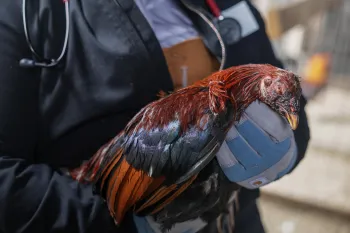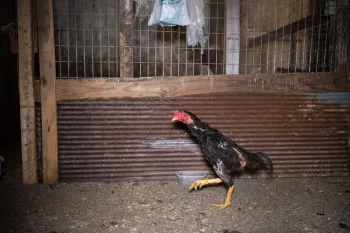You don’t need to see a cockfight in progress to comprehend the misery, suffering and death that animal fighting causes. All you need to do is look at the breeding operations that service the cockfighting industry—barren, dismal and hopeless places, every one of them—and there are thousands across the country, even though cockfighting is illegal in all 50 states and under federal law.
But in Kansas, it appears, there’s now one fewer site of such cruelty, because, on Jan. 25, law enforcement officials from the Sumner County Sheriff’s Office served a search and seizure warrant and took action at a property in Mulvane, near Wichita. With responders from Humane World for Animals and Humane Society of Greater Kansas City there to assist, officials found more than 400 roosters and hens in small wire or wooden structures with little protection from freezing temperatures. Some of the birds were afflicted with eye and nasal discharge—the signs of apparent respiratory illness, particularly concerning right now—and two roosters were covered in dried blood, with open wounds.
The response teams found cockfighting paraphernalia too, including transport boxes, scales and gaffs—sharp blades attached to roosters’ legs during fights. Our experts identified the birds on site as gamefowl, a term for birds selectively bred and raised for aggression and fighting.
A detective working the case credited previous training with our teams as indispensable to her work at the scene. This was encouraging because educating humane and law enforcement agents is a priority for us. This week, our Humane World for Animals Law Enforcement Training Center co-hosted a cockfighting investigations webinar with the National Sheriffs’ Association, an active partner in the campaign to end cockfighting. Nearly 400 officers registered, many from states in which cockfighting is a major law enforcement concern.
In addition to such training activities, we support prosecutors and other law enforcement personnel with their assessment and handling of complex cases. We’re also pursuing a comprehensive agenda to fortify state-level laws in key states, including Kentucky, Georgia, California, Maryland, Florida and Texas. We’re particularly committed to working in the 11 states that do not prohibit breeding and trafficking gamefowl for fighting.
In a cynical play, cockfighters and their allies in a few state capitals have organized faked-up civic organizations that exist for a single, dishonorable purpose: to reduce or eliminate penalties for cockfighting. These “gamefowl commissions” host rallies, raise funds and make political contributions in support of attempts to decriminalize cockfighting. Known cockfighters have even surfaced as “expert witnesses” in these efforts. In Oklahoma last year, this nearly Orwellian approach resulted in a dangerous proposal to reduce penalties for cockfighting and dogfighting to a misdemeanor—which, we’re glad to report, stalled out in the legislature.
In the 21st century, of course, cockfighting is not merely a criminal industry but an incubation system for dangerous diseases, including the highly pathogenic avian influenza H5N1 now ravaging commercial flocks of chickens and plaguing big cats and other animals at wildlife rescue centers, to name just several of the most prominent instances of zoonotic transmission. Together, the real risk of disease spread and the poor prospects for placement of roosters trained to be aggressive mean that animals from situations like the one in Mulvane are generally not adopted out; in this case, all the animals had to be euthanized at the scene.
Cockfighting is a serious crime. That's no radical position. It is the law in all 50 states, and multiple polls through the years have helped to make it clear that people from coast to coast—in states red, blue and purple—disapprove of cockfighting. Most recently, a July 2024 poll we commissioned found that 90% of Democrats, 88% of Republicans and 87% of independents support stronger laws on the issue.
Recognizing the severity of the problem, the National Sheriffs’ Association has formally declared animal fighting a crime of violence, urging all levels of government to uphold and strengthen penalties.
At the federal level, we have successfully pressed for animal fighting upgrades to the Animal Welfare Act on five occasions. At this time, our focus is on enforcement and most recently, we’ve encouraged the government to maintain strong sentencing guidelines for animal fighting offenses because of our understanding that cockfighting and dogfighting are malicious crimes and frequently connected to other serious criminal activities.
With animal fighting classified as a felony crime under the AWA, we’ve also sought to encourage better collaboration between the U.S. Department of Agriculture and the Department of Justice (along with other partners) through appropriations requests and other means. This is challenging at present, as potential agency cuts could result in fewer staff positions, smaller budgets, weaker cross-reporting and less funding for state, local and tribal law enforcement efforts.
We’ll keep pushing. Time and again, our team members hear from legislators and others surprised that cockfighting continues after all the negative publicity it has received and all the laws that have passed. Not enough people understand that cockfighting is a multi-million dollar industry in which participants are willing to take their chances of discovery and arrest in situations where the financial rewards of participation far outweigh the risks.
That’s why we push lawmakers and government agencies to step up their efforts to make anti-cockfighting laws tougher and to see that they are better enforced. Not just in this country, either. We are increasingly focused on the global dimensions of this problem, because cockfighters are shipping animals all over the world for profit. Beyond causing massive animal suffering, what they’re doing threatens to exacerbate the spread of avian diseases. We’ve done some important work to curb animal fighting in Costa Rica, India and the EU, for example. In Costa Rica, where cockfighting is illegal, we helped to turn back a legal challenge from cockfighters who tried to argue they had a cultural right to fight roosters under the constitution.
Cockfighting’s cruelty is not a matter of opinion. It’s an objective fact, and the same is true for its obvious public health and safety risks. We can’t afford to be complacent about it, and we can’t afford to let policymakers be complacent either. The massive suffering the birds endure propels our efforts to get at the root causes of cockfighting, in order to stop it for good.
Sara Amundson is president of Humane World Action Fund.




